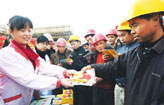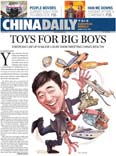German conglomerate expands footprint in China
Updated: 2011-04-15 11:24
By Shi Jing (China Daily European Weekly)
ThyssenKrupp opens Nanjing forging facility in latest move to tap increasingly important market
Leading German industrial materials supplier ThyssenKrupp AG has held its first board meeting outside Germany in a sign of the growing importance of the Chinese market.
The meeting, held in Nanjing in East China's Jiangsu province in early April, coincided with the opening of the conglomerate's forging facilities, also in Nanjing, with an annual production capacity of 360,000 crankshafts.
ThyssenKrupp is not new to the Chinese market. Its products are found in a number of landmark projects in major Chinese cities, particularly Shanghai. It supplied the express elevators that travel at 10 meters a second in the Shanghai World Financial Center, one of the tallest buildings in Asia, and the world's first commercial maglev train that connects Shanghai's international airport with the city's mass transit system.
"With the launch of our Nanjing plant, we will be able to further explore that market in China, which produces more than half of the heavy-duty commercial cars in the world," says Karsten Kroos, chairman of the management board of the components technology business area of ThyssenKrupp AG.
ThyssenKrupp has invested $190 million (131 million euros) in the new plant. Covering 190,000 square meters, the forging plant started construction in late 2010 and will begin production by October 2012, providing job opportunities to about 650 local workers.
The facility boasts a forging press machine, touted as the largest in the engineering industry, for making quality crankshafts.
The forging plant is expected to cater to the growing demand for heavy duty and mid-range commercial vehicles in the Chinese market. It also aims to give Chinese manufacturers access to high-technology engine components to support the introduction of Euro IV or V emission standards.
ThyssenKrupp recorded total sales of 42 billion euros and ranked 123th in the Fortune 500 companies list in 2010.
Last year, global sales of engineering machinery reached $131 billion with China contributing about $40.6 billion, or 31 percent, to the sector.
According to Heinrich Hiesinger, chairman of the executive board at ThyssenKrupp AG, the Chinese market has always been the most important in Asia. The group's sales in China amounted to 2 billion euros in the fiscal year from 2009 to 2010, only next to the United States, Italy and France.
About 11,000 employees are now working at about 45 ThyssenKrupp plants or companies in China.
"We have been seeing an average annual growth of 12 percent ever since 2005," Hiesinger says.
The board of directors of ThyssenKrupp expect the Chinese government to invest more in infrastructure such as affordable housing and transportation during the 12th Five-Year Plan period (2011-2015), which will result in a larger demand for engineering machinery.
According to Hiesigner, there will be 221 cities in China with a population of more than 1 million by 2025, among which eight of them will hold a population of more than 10 million.
"By that time, people are clustered in a more densely populated area. Therefore, it gives ThyssenKrupp a chance to come out with a new and creative transportation plan," Hiesinger says.
ThyssenKrupp has participated in China's transportation construction in 2010. The group took part in the construction of eight high-speed train lines, providing a full-range passenger transport system for the high-speed train stations. The order was considered the group's largest.
Hiensinger says the country is set to build about 80 airports over the next eight years, which guarantees a huge potential market for ThyssenKrupp.
But the engineering giant has also noticed that China has set a lower target for its GDP growth in the next five years, attaching more importance to sustainable growth, energy saving and emissions reduction.
"As our group's latest report shows, the number of private cars in China will rise from 26 million to 100 million within 10 years. The ever growing demand has posed a challenge for us to come up with products that will bring harm to the environment at a minimum level," Hiesinger says.
To incubate more engineering talent in China, the group also signed cooperation agreements with three technical schools in Nanjing. Qualified graduates will be given a chance to work at the crankshaft plant in the city. Six top students will also be offered a chance to study in the headquarters in Germany every year.
But ThyssenKrupp does not seem to be in a hurry to make profits in China.
"We are not going to make any profits from the Nanjing plant within the following two years. And it is a rule in the engineering machinery industry that it will take about 10 years for a company to make profits," says Olaf Berlien, chairman of the executive board of ThyssenKrupp Elevator AG.
"But still one thing is for sure. The Chinese market is big enough for us to stay optimistic about it."
E-paper

Han me downs
Traditional 3,000-year-old clothes are making a comeback.
Reaching out
Fast growth fuels rise in super rich
Chinese tourists spend more
Specials

Big spenders
More mainland tourists are expected to spend money on overseas travel this year.

Rise in super rich
Report cites rising property prices, gdp as key drivers of increasing number of chinese millionaires.

Reaching out
Condom makers are stepping up their presence in smaller cities to boost sales
